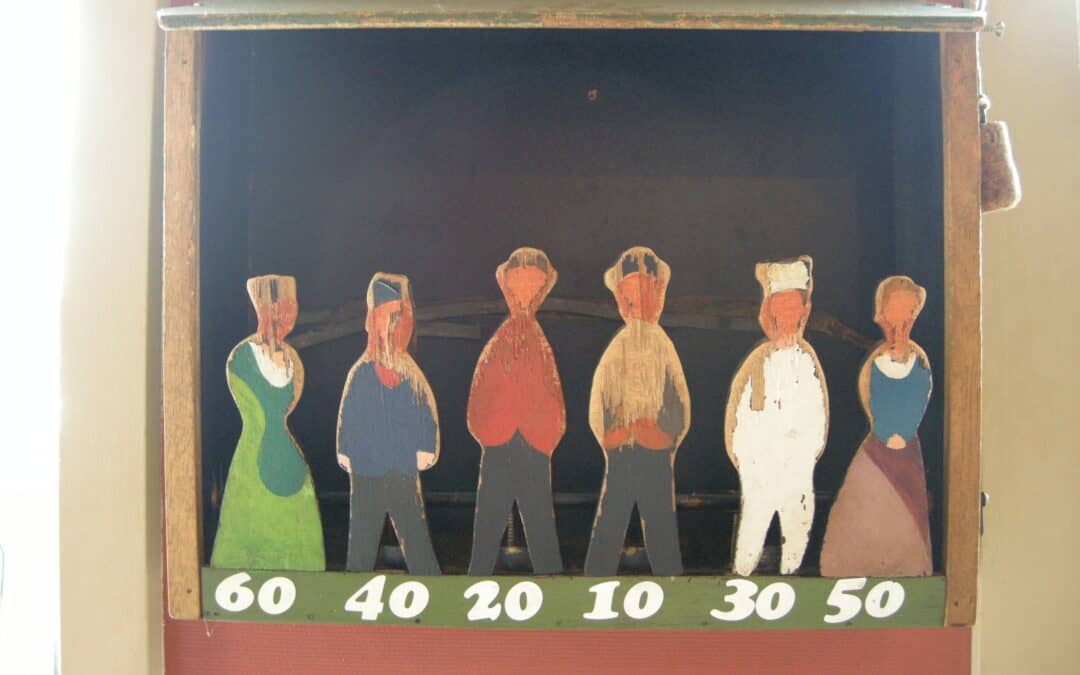I really like these extracts from Undertones of War. Blunden spent two Christmas periods in the Ypres area, and one near Arras in 1918.
If you are in the Ieper (Ypres) area of Belgium when it’s winter, there’s nothing better than a dish of Potjevleesch (a light coloured meat stew of a variety of meats) washed down with the local beer -still produced – Poperings Hommelbier. Both seem to cut the wind, and although the tavern wasn’t the one he later used, it would have been heated by a typically solid Flemish stove. When possible, Blunden more regularly visited the Straw Hen (De Strooye Hen, in Sint Jan ter Biezen) where some of the interior is as Blunden would have known it. Also, it is not far from the site of M Camp or Poperinghe. The image above is of a bar billiards game from the Straw Hen that would have been there in Blunden’s time.
Re-reading these first and last paragraphs of the chapter makes me appreciate what a master of the English language Blunden is – and shows how much the poorer our current vernacular has become.
The setting, as described at the time, is in complete contrast to the wasted landscape of the Somme battlefield to the south, and Blunden is pleased to re-unite with fellow officers Swain and Maycock, his commander Colonel Harrison and his most loyal friend Sgt Worley. Harrison and Worley remained his friends until their deaths many years later.
“So we have come North! We did not expect this, ten days ago. It is midnight, with intense stars and darkness, and one has rarely felt the frost strike sharper (the ponderous journey scarcely having aided the body to repel the climate); but we have come North, and the ground is solid and clean. The battalion detrains at an unknown siding and its forerunners guide it in to unknown M Camp. I am warmed by the sight of my old confederate Sergeant Worley, in the exit of the siding; he gives his usual candid views on the situation, but is on the whole favourable to it; and we go along the cobbled road between level fields. Suddenly turning aside we find the quartermaster and transport officer, Swain and Maycock, who, stamping their feet, rejoice with me, and Maycock seizes my shoulders with gloved hand and pretends to dance. These invincible officers have a pleasant surprise for us, and, although it is midnight, there is soon a sound of revelry. In a large wooden tavern a cheerful Belgian girl, under the argus-eyed direction of a masculine mother, is soon running hither and thither among the veterans, from colonel to subaltern, with some of the best victuals ever known. Rave on, you savage east, and gloom, you small hours; we will take our ease in our inn, by the red-hot stoves. We have come through.”
Later….
“Now winter, throwing aside his sleep and drowse, came out fierce and determined: first there was a heavy snow, then the blue sky of hard frost. To our pleasure, we were back in a camp in the woods by Elverdinghe to celebrate Christmas. The snow was crystal-clean, the trees filigreed and golden. It was a place that retained its boorish loneliness, though hundreds were there; its odd buildings had the suggestion of Teniers. Harrison’s Christmas was appreciated by his followers perhaps more than by himself. He held a Church Parade and, while officiating, reading a Lesson or so, was interrupted by the Band, which somehow mistook its cue. The Colonel is thought to have said ‘hold your b—-noise’ on this contretemps, which did not damp the ardour of the congregation, especially the back part of the room, as they thundered out ‘While Shepherds Watched’. After prayers we had supper for the rest of the day, and the Colonel visited all the men at their Christmas dinner. At each hut, he was required by tradition to perfect the joy of his stalwarts by drinking some specially and cunningly provided liquid, varying with each company, and ‘in a mug.’ He got round, but it was almost as much as intrepidity could accomplish.”
From Chapter XIV – Undertones of War, 1928, Edited by John Greening 2015.

